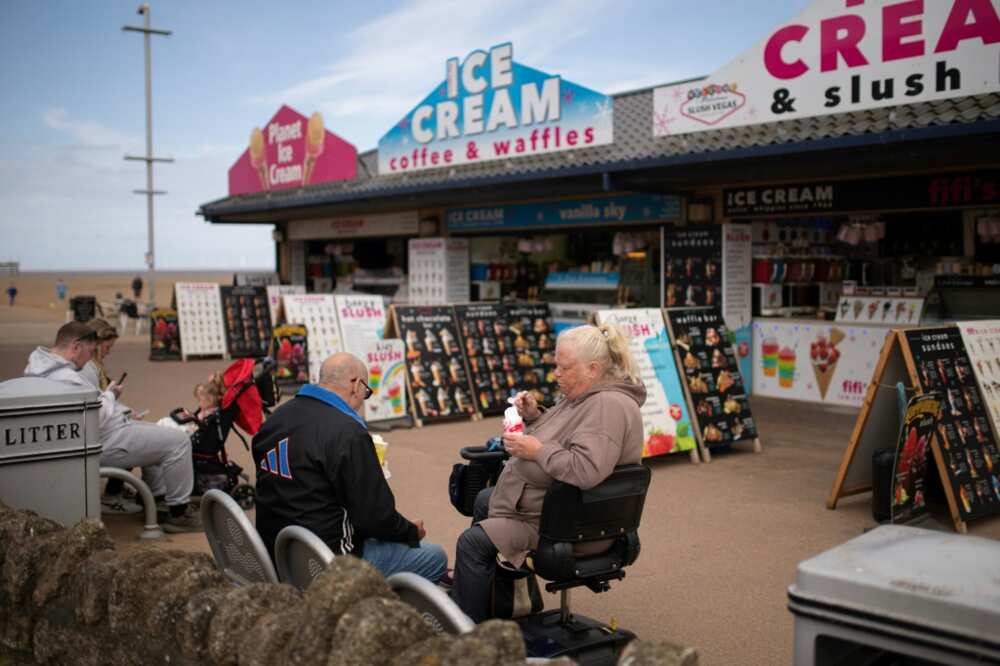 Britain's last general election was all about leaving the EU but this time around Brexit is hardly getting a mention.
Photo: Oli SCARFF / AFP
Britain's last general election was all about leaving the EU but this time around Brexit is hardly getting a mention.
Photo: Oli SCARFF / AFPSource: AFP
Eight years after Britain voted for Brexit, businesses still lament economic fallout caused by the country's departure from the European Union, with little prospect of change after this week's election.
"After Brexit, I had to close my second shop to cut my loss," ice-cream parlour owner Diego Alfonso told AFP during an election campaign where both main parties have largely avoided talking about the EU divorce.
Alfonso, 37, set up "Bertotti" with his wife Suzana in 2012, four years before Britain voted in favour of exiting the bloc.
Keir Starmer, whose Labour party is tipped to win the vote on Thursday, has ruled out returning Britain to the European single market, customs union, or bringing back free movement of EU nationals.
Alfonso noted that "you could get things from the European Union very easily" before Brexit.
"Now, everything has so much bureaucracy. You need to fill out so many forms," he added from his remaining store in Hammersmith, a west London suburb.
PAY ATTENTION: Share your outstanding story with our editors! Please reach us through info@corp.legit.ng!
This has increased the cost of doing business, hitting companies at a time when inflation began to take off as economies emerged from Covid lockdowns and in the wake of Russia's invasion of Ukraine, which in particular forced up food and energy prices.
One scoop of Bertotti gelato, whose flavours range from lavender to honeycomb and dragon fruit, costs £3.90 ($4.90), up more than 40 percent since before the Brexit vote.
The price surge has hit demand, in a country where the weather is not associated with eating ice cream all year round.
'Is this worth it?'
"There's been a lot of times that we thought we weren't going to make it," said Alfonso, who turned the closed store into a workshop producing the ice cream thanks to ingredients and machinery from Europe.
"Some suppliers from the EU will sometimes not supply you, because it's a bit more work for them as well," he said, adding that the price of imported waffle cones has also soared in recent years.
Added to the picture, Britain's new post-Brexit border controls have caused delivery delays, extra costs and labour shortages.
The UK in a Changing Europe think-tank has said the annual cost of new UK customs declarations could total about £15 billion.
Other consequences of Brexit "red tape" include amended driving regulations and the loss of tens of thousands of young European seasonal workers who were allowed into Britain without work permits.
As a result, Bertotti's workforce has shrunk.
"It hasn't been easy, and there were times when we were like, is this worth it?," said Alfonso.
"We found new ways to make more money. We started supplying restaurants... going to festivals, getting our name out there.
"We're just breaking even but it's nothing compared to what it used to be. I don't want to quit because this is my passion, this is my business... my family," the owner added.
Cost to UK output
Bertotti is far from an isolated case. Rivet & Hide, a supplier of high-end men's clothing, says its turnover with the European Union has fallen by 50 percent since Brexit came into force.
Owner Danny Hodgson has raised prices to cover import taxes, in particular for leather items, as well as for export charges.
If the business community was largely opposed to Brexit, sectors which did support it such as fishing admit that leaving the EU has failed to deliver the economic benefits that were promised.
The Institute for Fiscal Studies think-tank and other economists estimate that the long-term cost of Brexit could be about four percent of UK gross domestic product.
Source: AFP
















 English (US) ·
English (US) ·